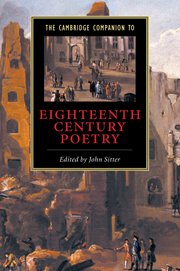Book contents
- Frontmatter
- 1 Introduction
- 2 Couplets and conversation
- 3 Political passions
- 4 Publishing and reading poetry
- 5 The city in eighteenth-century poetry
- 6 “Nature” poetry
- 7 Questions in poetics
- 8 Eighteenth-century women poets and readers
- 9 Creating a national poetry
- 10 The return to the ode
- 11 A poetry of absence
- 12 The poetry of sensibility
- 13 “Pre-Romanticism” and the ends of eighteenth-century poetry
- Index
13 - “Pre-Romanticism” and the ends of eighteenth-century poetry
Published online by Cambridge University Press: 28 May 2006
- Frontmatter
- 1 Introduction
- 2 Couplets and conversation
- 3 Political passions
- 4 Publishing and reading poetry
- 5 The city in eighteenth-century poetry
- 6 “Nature” poetry
- 7 Questions in poetics
- 8 Eighteenth-century women poets and readers
- 9 Creating a national poetry
- 10 The return to the ode
- 11 A poetry of absence
- 12 The poetry of sensibility
- 13 “Pre-Romanticism” and the ends of eighteenth-century poetry
- Index
Summary
Finding satisfactory labels for the poetry of the last decades of the eighteenth century has proven particularly difficult because most existing labels carry certain value judgments that diminish the worth or specificity of this poetry. Poetry from Pope's death in 1744 to the early publications of the first generation of Romantic poets in the 1790s has occasionally been defined according to its immediate past, by calling it “post-Augustan,” but more often according to the future, by calling it “pre-Romantic.” In an important essay first published in 1956, Northrop Frye suggested that we call this period an “Age of Sensibility” rather than define it transitionally “as a period of reaction against Pope and anticipation of Wordsworth.” While the label “Poetry of Sensibility” has gained some currency among specialists, “pre- Romanticism” continues to be used for this poetry, especially by nonspecialists. Unfortunately, the label “pre-Romanticism” is seriously misleading to characterize the ends - the last poems as well as the objectives - of late-eighteenth-century poetry.
- Type
- Chapter
- Information
- The Cambridge Companion to Eighteenth-Century Poetry , pp. 271 - 290Publisher: Cambridge University PressPrint publication year: 2001
- 3
- Cited by



